Object Oriented Programming in PHP
- 1. iFour ConsultancyOOP with PHP web Engineering || winter 2017 wahidullah Mudaser assignment.cs2017@gmail.com Lecture 09 OOP in PHP
- 2. Classes and objects Methods and properties Scope Inheritance Static methods and properties Constants Abstraction interfaces OUTLINE
- 3. The idea of Object Oriented Programming is to move the architecture of an application closer to real world Classes are types of entities Objects are single units of a given class Example – Dog is a class, your dog Lassie is an object of class Dog Classes have methods and properties Classes and objects help to create well-structured application Classes and objects
- 4. Declaring of a class in PHP can be done anywhere in the code. Two special methods: constructor and destructor Executed when creating or destroying new object of this class Used to initialize or cleanup properties and etc. Classes in PHP class Dog { … // declare methods and properties }
- 5. Classes in PHP Class definition begins with the class keyword, followed by its name and methods and properties list Objects of class (instances) are created with the keyword new class A { function foo () { echo "foo here!"; } } $myFirstObject = new A(); $myFirstObject->foo(); // prints out "foo here!"; class name Method name and body Create new object of class A Execute method of this object
- 6. Constructors Each class can have only one constructor All parameters of the creating of the object are passed to the constructor class A { function __construct ($bar) { echo $bar; } function foo () { echo "foo here!"; } } $myFirstObject = new A('test'); // print 'test'
- 7. Properties Class can have unlimited number of properties The $this variable points to the current object – called execution context class A { var $bar; function __construct ($bar) { $this->bar = $bar; } function myPrint () { echo $this->bar; } } $myFirstObject = new A('test'); $myFirstObject->myPrint();
- 8. More Properties Class can specify default value for a property Properties can be accessed from the outside world class A { var $bar = 'default value'; … class A { var $bar = 'default value'; … } $obj = new A; echo $obj->bar;
- 9. $this Example of what $this is Can be used to access methods too class A { var $bar; function __construct ($bar) { $this->bar = $bar; } function myPrint () { echo $this->bar; } } $myFirstObject = new A('test'); $myFirstObject->myPrint(); // prints 'test' $anotherObject = new A('foo'); $anotherObject ->myPrint(); // prints 'foo';
- 10. Destructors Each class can have only one destructor Must be public Destructors are automatically called when script is shutting down class A { function __construct ($name) { $this->fp = fopen ($name, 'r'); } function __destruct () { fclose($this->fp); } } $myFirstObject = new A('test');
- 11. Scope Each method and property has a scope It defines who can access it Three levels – public, protected, private Private can be access only by the object itself Protected can be accessed by descendant classes (see inheritance) Public can be accessed from the outside world Level is added before function keyword or instead of var var is old style (PHP 4) equivalent to public Constructors always need to be public
- 12. Scope Example class A { private $bar; public function __construct ($bar) { $this->bar = $bar; } public function myPrint () { echo $this->bar; } } $myFirstObject = new A('test'); $myFirstObject->myPrint(); // prints 'test' // this will not work: echo $myFirstObject->bar; The $bar variable is private so only the object can access it The myPrint method is public, so everyone can call it
- 13. Inheritance A class can inherit (extend) another class It inherits all its methods and properties class A { public $bar = 'test'; public function example () { … } } class B extends A { … } $obj = new B(); echo $obj->bar; //prints 'test' //calls the A-class function $obj->example();
- 14. Protected Scope Method or property, declared as protected can be accessed in classes that inherit it, but cannot be accessed from the outside world class A { protected $bar = 'test'; } class B extends A { public function foo () { // this is allowed $this->bar = 'I see it'; } } $obj = new B(); echo $obj->bar; //not allowed
- 15. Overriding When a class inherits another, it can declare methods that override parent class methods Method names are the same Parameters may differ class A { public foo() { … } } class B extends A { public foo() { … } }
- 16. Overriding Example class A { public foo() { echo 'called from A'; } } class B extends A { public foo() { echo 'called from B'; } } $obj1 = new A(); $obj2 = new B(); $obj1->foo(); // executes A's methods $obj2->foo(); // executes B's methods
- 17. Accessing Parent Class As -> is used to access object's methods and properties, the :: (double colon) is used to change scope Scope Resolution Operator parent:: can be used to access parent's class overridden methods Example: call parent's constructor in the child one
- 18. Accessing Parent Class Example of calling parent constructor class A { protected $variable; public __construct() { $this->variable = 'test'; } } class B extends A { public __construct() { parent::__construct(); echo $this->variable; } } $obj1 = new B(); // prints 'test';
- 19. The static Keyword Defining method or property as 'static' makes them accessible without needing an instantiation of a class Accessed with the double-colon (::) operator instead of the member (->) operator $this is not available in static methods Static properties and methods can also have scope defined – public, private or protected
- 20. The static Keyword Example of static method and property Class can access statics with the self keyword Outside world accesses statics with the class name class A { public static $myVariable; public static function myPrint() { echo self::$myVariable; } } A::$myVariable = 'test'; A::myPrint();
- 21. Class Constants Constants in PHP usually are declared with the define function Constants can be defined in class Differ from normal variables – no need for $ symbol to declare and access Declared with the const keyword Value must be supplied with the declaration Accessed with scope operator (::) Can be overridden by child classes Value must be constant expression, not a variable, class member, result of operation or function call
- 22. Class Constants Example of a class constant class A { const myConstant = 'value'; public function showConstant() { echo self::myConstant; } } echo A::myConstant; $obj = new A(); $obj->showConstant();
- 23. Abstraction Classes, defined as abstract, cannot have instances (cannot create object of this class) Abstract class must have at least one abstract method Abstract methods do not have implementation (body) in the class Only signature The class must be inherited The child class must implement all abstract methods Cannot increase visibility
- 24. Abstraction Example abstract class AbstractClass { abstract protected function getValue(); abstract public function getValue2($prefix); public function printOut () { echo $this->getValue(); } } class Class1 extends AbstractClass { protected function getValue (){ return "Class1"; } public function getValue2($prefix) { return $prefix."NAC1"; } }
- 25. Abstraction Example (2) // continue from previous slide class Class2 extends AbstractClass { protected function getValue (){ return "Class2"; } public function getValue2($prefix) { return $prefix."NAC2"; } } $class1 = new Class1(); $class1->printOut(); // "Class1"; echo $class1->getValue2('FOO'); // FOONAC1 $class2 = new Class2(); $class2->printOut(); // "Class2"; echo $class2->getValue2('FOO'); //FOONAC2
- 26. Interfaces Object interfaces allow you to specify what methods a child class must implement Declared with the interface keyword Similar to abstract class Interface can have only public methods No method in interface can have implementation Interfaces are inherited with the implements keyword (instead of extends) One class may implement multiple interfaces, if they do not have methods with same names
- 27. Interface Example interface iTemplate { public function set ($name, $value); public function getHTML($template); } class Template implements iTemplate { private $vars = array(); public function set ($name, $value) { $this->vars[$name] = $value; } public function getHTML($template) { foreach($this->vars as $name=>$value) { $template = str_replace( '{'.$name.'}', $value, $template); } return $template; } }
- 28. Questions? http://www.ifourtechnolab.com/ ASP.NET Software Development Companies India



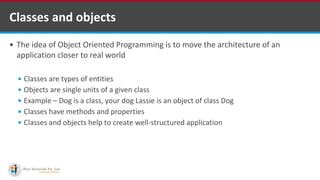



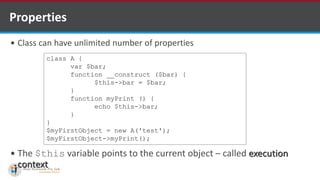

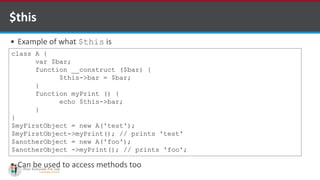





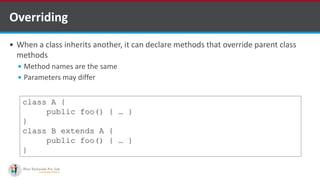

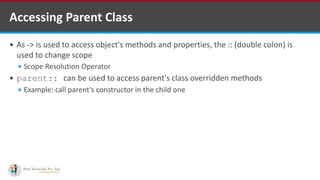


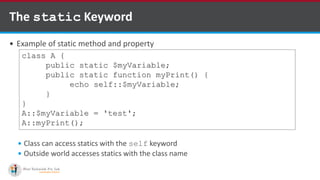
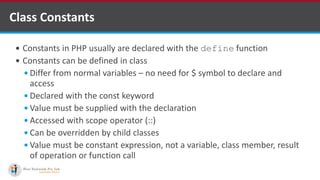
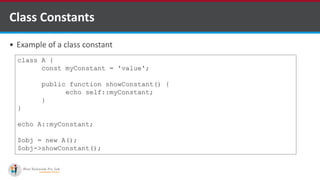
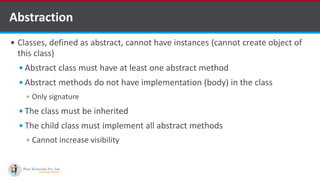



![Interface Example
interface iTemplate {
public function set ($name, $value);
public function getHTML($template);
}
class Template implements iTemplate {
private $vars = array();
public function set ($name, $value) {
$this->vars[$name] = $value;
}
public function getHTML($template) {
foreach($this->vars as $name=>$value) {
$template = str_replace(
'{'.$name.'}', $value, $template);
}
return $template;
}
}](https://image.slidesharecdn.com/09phplecture-190414050848/85/Object-Oriented-Programming-in-PHP-27-320.jpg)
